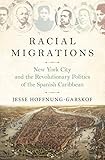Racial Migrations : New York City and the Revolutionary Politics of the Spanish Caribbean / Jesse Hoffnung-Garskof.
Material type: TextPublisher: Princeton, NJ : Princeton University Press, [2019]Copyright date: ©2019Description: 1 online resource (408 p.)Content type:
TextPublisher: Princeton, NJ : Princeton University Press, [2019]Copyright date: ©2019Description: 1 online resource (408 p.)Content type: - 9780691183534
- 9780691185750
- Blacks -- Cuba -- Politics and government -- 19th century
- Cubans -- New York (State) -- New York -- Politics and government -- 19th century
- Immigrants -- New York (State) -- New York -- Politics and government -- 19th century
- Puerto Ricans -- New York (State) -- New York -- Politics and government -- 19th century
- HISTORY / United States / 19th Century
- 974.7104687291 23
- F128.9.C97
- online - DeGruyter
- Issued also in print.
| Item type | Current library | Call number | URL | Status | Notes | Barcode | |
|---|---|---|---|---|---|---|---|
 eBook
eBook
|
Biblioteca "Angelicum" Pont. Univ. S.Tommaso d'Aquino Nuvola online | online - DeGruyter (Browse shelf(Opens below)) | Online access | Not for loan (Accesso limitato) | Accesso per gli utenti autorizzati / Access for authorized users | (dgr)9780691185750 |
Browsing Biblioteca "Angelicum" Pont. Univ. S.Tommaso d'Aquino shelves, Shelving location: Nuvola online Close shelf browser (Hides shelf browser)

|

|

|

|

|

|

|
||
| online - DeGruyter The Power of Cute / | online - DeGruyter On Mercy / | online - DeGruyter On the Life of Galileo : Viviani's Historical Account and Other Early Biographies / | online - DeGruyter Racial Migrations : New York City and the Revolutionary Politics of the Spanish Caribbean / | online - DeGruyter Red Meat Republic : A Hoof-to-Table History of How Beef Changed America / | online - DeGruyter The Wealth of Religions : The Political Economy of Believing and Belonging / | online - DeGruyter Going the Distance : Eurasian Trade and the Rise of the Business Corporation, 1400-1700 / |
Frontmatter -- CONTENTS -- Cast of Characters -- Prologue: Radial Lines -- Chapter 1. Beginnings -- Chapter 2. The Public Square -- Chapter 3. Community -- Chapter 4. Convergence -- Chapter 5. Crossing -- Chapter 6. Victory? -- Endings -- Acknowledgments -- A Note on Sources -- Notes -- Bibliography -- Index
restricted access online access with authorization star
http://purl.org/coar/access_right/c_16ec
The gripping history of Afro-Latino migrants who conspired to overthrow a colonial monarchy, end slavery, and secure full citizenship in their homelandsIn the late nineteenth century, a small group of Cubans and Puerto Ricans of African descent settled in the segregated tenements of New York City. At an immigrant educational society in Greenwich Village, these early Afro-Latino New Yorkers taught themselves to be poets, journalists, and revolutionaries. At the same time, these individuals-including Rafael Serra, a cigar maker, writer, and politician; Sotero Figueroa, a typesetter, editor, and publisher; and Gertrudis Heredia, one of the first women of African descent to study midwifery at the University of Havana-built a political network and articulated an ideal of revolutionary nationalism centered on the projects of racial and social justice. These efforts were critical to the poet and diplomat José Martí's writings about race and his bid for leadership among Cuban exiles, and to the later struggle to create space for black political participation in the Cuban Republic.In Racial Migrations, Jesse Hoffnung-Garskof presents a vivid portrait of these largely forgotten migrant revolutionaries, weaving together their experiences of migrating while black, their relationships with African American civil rights leaders, and their evolving participation in nationalist political movements. By placing Afro-Latino New Yorkers at the center of the story, Hoffnung-Garskof offers a new interpretation of the revolutionary politics of the Spanish Caribbean, including the idea that Cuba could become a nation without racial divisions.A model of transnational and comparative research, Racial Migrations reveals the complexities of race-making within migrant communities and the power of small groups of immigrants to transform their home societies.
Issued also in print.
Mode of access: Internet via World Wide Web.
In English.
Description based on online resource; title from PDF title page (publisher's Web site, viewed 29. Jul 2021)


